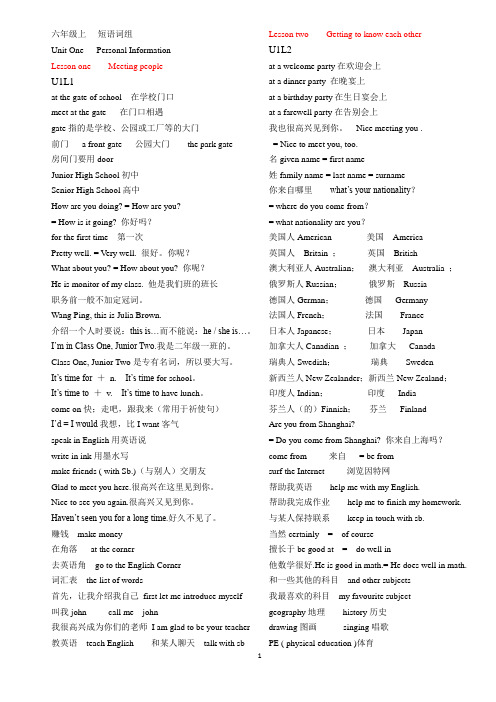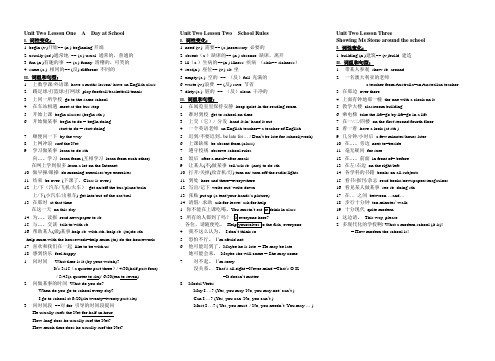初中英语新世纪版六年级第一学期U2L2School rules
- 格式:ppt
- 大小:749.00 KB
- 文档页数:12

吴淞二中英语教研组学案(2013.9-2014.1)2013学年第二学期六年级上Unit Two Lesson Two School RulesKey words,phrases and structures from the text and reading (核心词汇、短语和必背句型)1. keep (vt. & vi. 保持) (keep, kept, kept)2. quiet (a. 安静的) keep quiet(保持安静) /keep clean(保持干净)/keep warm(保持温暖)keep+a.(形容词)3. reading room 阅览室music room ( 音乐室) library(图书馆) language lab (语言实验室) school clinic (校医务室)4. on time (准时) in time (及时)eg. a) The flight is on time. (这次航班准时到达。
)b) The doctor came in time to save his life.(医生及时来抢救他的生命。
)5. hand in (上交) hand (n. 手;v. 递交) hand it in (把它交上来)eg. Please hand in your homework. (请把作业交给我。
)6. need ( vt.&n.必要,需要;v.aux. 需要) necessary(a. 必要的)肯定:need+n./ need to do 需要某物/需要做某事否定:needn’t + do = don’t / doesn’t need to do (不需要做某事)needn’t + n. 不需要某物注:don’t need/ doesn’t need + n. (×) 是错误的eg. a) I need some water. 我需要水b) We needn’t go to school this Friday. = We don’t need to go to school this Friday. 我们本周五不需要去学校。



六年级上----短语词组Unit One Personal InformationLesson one Meeting peopleU1L1at the gate of school 在学校门口meet at the gate 在门口相遇gate指的是学校、公园或工厂等的大门前门 a front gate 公园大门the park gate房间门要用doorJunior High School初中Senior High School高中How are you doing? = How are you?= How is it going? 你好吗?for the first time 第一次Pretty well. = Very well. 很好。
你呢?What about you? = How about you? 你呢?He is monitor of my class. 他是我们班的班长职务前一般不加定冠词。
Wang Ping, this is Julia Brown.介绍一个人时要说:this is…而不能说:he / she is…。
I’m in Class One, Junior Two.我是二年级一班的。
Class One, Junior Two是专有名词,所以要大写。
It’s time for +n. It’s time for school。
It’s time to +v. It’s time to have lunch。
come on快;走吧,跟我来(常用于祈使句)I’d = I would我想,比I want客气speak in English用英语说write in ink用墨水写make friends ( with Sb.)(与别人)交朋友Glad to meet you here.很高兴在这里见到你。
Nice to see you again.很高兴又见到你。
Haven’t seen you for a long time.好久不见了。

六上英语u1和u2的知识点以下是六年级上册Unit 1和Unit 2的英语知识点:Unit 1 How can I get there?1. 核心词汇near 在……附近far 远的ask 询问answer 回答restaurant 餐馆bank 银行post office 邮局hospital 医院turn 转向left 向左right 向右straight 直直地then 然后crossing 十字路口next to 挨着in front of 在……前面behind 在……后面on the left/right 在左边/右边2. 核心句型Excuse me, how can I get to the ...? 打扰一下,请问如何去……? Turn left/right at the ...turning. 在第……个路口向左/右转。
It's ... from here. 从这里走……。
3. 其他知识点on foot 步行take the bus 乘公共汽车by train 乘火车go straight on 直直走in front of 在……前面behind 在……后面turn left/right 向左/右转next to 挨着Unit 2 Ways to go to school1. 核心词汇by (表示方式)乘(车)by bus 乘公共汽车by train 乘火车by ship 乘轮船by plane 乘飞机on foot 步行2. 核心句型I usually come/go to school by bike. 我通常骑自行车去上学。
How do you come to school? 你怎样来到学校的?3. 其他知识点in English 用英语(表达)in Chinese 用中文(表达)。

Unit Two Lesson One A Day at SchoolI. 词性变化:1. begin (v.)开始~~ (n.) beginning开端2. usually (ad.)通常地~~ (a.) usual 通常的,普通的3. fun (n.)有趣的事~~ (a.) funny 滑稽的,可笑的4. same (a.) 相同的~~ (反) different 不同的II. 词组和句型:1.上数学课/外语课have a maths lesson/ have an English class2.踢足球/打篮球/打网球play football/basketball/tennis3.上同一所学校go to the same school4.在车站相遇meet at the bus stop5.开始上课begin classes (begin sth.)6.开始做某事begin to do = begin doingstart to do = start doing7.顺便问一下by the way8.上网冲浪surf the Net9.学习做某事learn to do sth.向。
学习learn from (互相学习learn from each other)在网上学到很多learn a lot on the Internet10.做早操/眼操do morning exercises/eye exercises11.结束be over. (下课了。
Class is over.)12.上/下(汽车/飞机/火车)get on/off the bus/plane/train上/下(小汽车/出租车) get into/out of the car/taxi13.在那时at that time在这一天on this day14.为。
读报read newspaper to sb.15.与。
交谈talk to/with sb.16.帮助某人(做)某事help sb. with sth./help sb. (to)do sth.help mum with the housework=help mum (to) do the housework17.喜欢和我们在一起like to be with us18.感到快乐feel happy1.问时间---What time is it (by your watch)?---It’s 3:15(a quarter past three)/ 4:30(half past four) / 5:45(a quarter to six)/ 6:50(ten to seven)2.问做某事的时间What do you do?--- When do you go to school every day?--- I go to school at 6:20(six twenty=twenty past six)3.问时间段~~对for 引导的时间段提问He usually surfs the Net for half an hour.How long does he usually surf the Net?How much time does he usually surf the Net? Unit Two Lesson Two School RulesI. 词性变化:1. need (v.) 需要~~ (a.)necessary 必要的2. absent(a.)缺席的~~ (n.) absence 缺席,离开3. ill(a.)生病的~~(n.) illness 疾病(sick~~ sickness)4. seat(n.) 座位~~ (v.) sit 坐5. empty (a.) 空的~~ (反)full 充满的6. waste (v.)浪费~~ (反) save 节省7. dirty (a.) 脏的~~ (反)clean 干净的II. 词组和句型:1.在阅览室里保持安静keep quiet in the reading room2.准时到校get to school on time3.上交(它)/ 分发hand it in/ hand it out4.一个英语老师an English teacher= a teacher of English5.迟到/不要迟到。
新世纪英语六年级第一学期期末复习 词组U2L2 School rules1.保持安静/保持阅览室安静keep quiet, keep the reading room quiet2.遵守学校规章制度observe the school rules3.在阅览室in the reading room4.请假ask for leave5.准时到校get to school on time6.上海国际学校Shanghai International School7.上交家庭作业hand in the homework8.互相交谈talk with each other9.说英语speak English10.四点放学School is over at four.11.在英语课上in an English class12.上课/开会迟到be late for class/meeting13.使我们的学校保持干净keep our classroom clean14.认真听老师讲课listen to the teacher carefully15.关灯/开灯/关掉收音机turn off/on the light,radio16.上课缺席be absent from the class17.回到你的座位go back to your seat18.一日三餐three meals a day19.到处here and there20.归还一些杂志/回上海return some magazines /return to Shanghai21.准时还书return the books on time22.保存。
两个星期keep…for two weeks23.使用一下电话use the telephone24.请病假ask for sick leave25.在桌上画画draw pictures on the desk26.把杂志带出阅览室take the magazines out of the reading room27.做早锻炼do morning exercises28.没有去上学be absent from school129.把规则写出来 write out the rules30.用英语回答问题 answer the questions in English31.乘公交车去学校 go to school by bus32.又迟到了 be late again33.把作业交上来 hand in one’s homework34.没关系 that’s all right35.不要浪费食物 Don’t waste food36.擦黑板 clean the blackboardU2L3 Showing Ms stone around the School37.在计算机房 in the computer room38.语言实验室隔壁 next to there is language lab39.在教学楼隔壁 beside the classroom building40.带领一些外籍教师参观这座城市 show some foreign teachers around thecity41.在语言实验室工作 work in the language lab42.上海第一高级中学 Shanghai No.1 Senior High School43.在男生宿舍楼附近 near the boys’ dormitory44.在诊所前面 in front of the clinic45.在四楼 on the fourth floor46.几分钟以后 a few minutes later47.乘电梯上上下下 go up and down in the lift48.一所现代化的学校 a modern school49.在语言实验室的左边 on the left of the language lab50.在教学楼的后面 behind the classroom building51.在诊所和食堂的之间 between the clinic and the cafeteria52.和同学谈论大学 talk with the classmates about the university53.步行只有10分钟的路程 only ten minutes’walk54.在校园里 on the campus55.看到学生在踢足球 see the students playing football56.咖啡茶几 coffee table57.听现代音乐/轻音乐 listen to the modern music/light music58.几分钟以后/在几分钟之内 a few minutes later/in a few minutes59.出黑板报 write for the wall newspaper60.在网上学到很多 learn a lot on the Internet61.等待校车 wait for the school busU3L1 What are your favourite food and drinks?62.水果和蔬菜 fruit and vegetables63.我最喜爱的食物和饮料 my favourite food64.最喜欢的西红柿 like tomatoes best65.比较喜欢猪肉 like the pork better66.喜欢吃鱼 care for/like eating fish67.两杯茶 two cups of tea68.一碗面条 a bowl of noodles69.一瓶橘子汁 a bottle of orange juice70.两碗西红柿汤 two bowls of tomato soup71.下次不要迟到 don’t be late again72.住在十二楼 live on the twelfth floor73.与表姐保持联系 keep in touch with cousin74.吃起来味道鲜美 taste delicious75.吃起来很甜 taste sweet76.汤姆的十岁生日 Tom’s tenth birthday77.新鲜蔬菜 fresh vegetables78.开班会 have a class meeting79.在世纪公园野餐 have a picnic in the century80.对我们身体有好处 be good for our health81.对牙齿有害 be bad for/be harmful to teeth82.健康食品 healthy food83.健康 be in good health/be healthy84.保持我们健康 keep us healthy85.对弹钢琴感兴趣 be interested in playing the piano86.使用刀叉 use the knives and forks87.一双筷子 a pair of chopsticks88.一个法国学生 a French student89.把。
龙文学校个性化辅导教案教师:学生:年级:时间:第次一、授课目的与考点分析1、目标:新授六上U22、重难点:四会词句,音标复习,巩固运用二、主题与教学过程:Step 1 Warm-up元音(20个)长元音/ɑ://ɔ:/ / ɜ:/ /i:/ /U:/短元音/ ʌ/ /ɒ/ /ə/ /ɪ/ /ʊ/ /e/ /æ/双元音/eɪ/ /aɪ/ /əʊ/ /aʊ//ɪə/ /eə/ /ʊə/ /ɔɪ/辅音(28个)轻辅音/p/ / t/ / k/ /f/ /s/ /θ/浊辅音/b/ /d/ /g/ /v/ /z/ /ð/轻辅音/ʃ/ /tʃ/ /ts/ /tr/ /h/浊辅音/ʒ/ /dʒ/ /dz/ /dr/ / r/鼻音/m/ /n/ /ŋ/半元音/ j/ / w/边音/ ǀ/词末尾:/ ǀ/R e a d a n d w r i t e:['laibrəri]_________ [pəust] ['ɔ:fis]__________ ['hɔspitl]__________ ['sinimə]__________ ['bukstɔ:]__________ ['saiəns] [mju:'zju:m]___________________ [iks'kju:z]________ ['nekst] [tu:]__________ [fɑ:]__________ ['ɑ:ftə] [sku:l]__________ [w∧nt]__________ [tə:n]__________[rait]__________[left]__________ [streit]__________ [ðen]__________[tel]__________ [teik]__________ [luk] [fɔ:]__________Step 2 Unit 2 Ways to go to schoolPresentation: The voice of the vehicleNew contentsWords and expressionsStructures:①询问交通方式用疑问代词how⏹——How do you go to school ? 你怎样去上学?/come to school(来学校)—— I go to school on foot . 我走路去上学。
schoolrules英语作文六年级全文共3篇示例,供读者参考篇1School RulesSchool rules are important guidelines put in place to ensure the safety, well-being, and success of all students. These rules help create a positive learning environment where everyone can thrive and reach their full potential. As a sixth grader, it's important to understand and follow these rules to have a successful and fulfilling school experience.One of the most important school rules is to respect others. This means treating your classmates, teachers, and school staff with kindness and courtesy. You should listen to others when they are speaking, raise your hand before speaking in class, and avoid disruptive behavior. By showing respect to others, you create a positive and supportive atmosphere for everyone to learn and grow.Another important school rule is to follow instructions. This means paying attention in class, completing assignments on time, and following directions from teachers and school staff. Byfollowing instructions, you demonstrate your commitment to learning and show that you take your education seriously.It's also important to be responsible for your actions. This means taking ownership of your behavior and making good choices both inside and outside of the classroom. If you make a mistake, own up to it and learn from it. By being responsible, you show maturity and integrity, which are important qualities to have in school and beyond.Respect for school property is another important rule to follow. This means taking care of school supplies, textbooks, and facilities. You should not deface or damage school property, as it is there for everyone to use and enjoy. By respecting school property, you contribute to a clean and safe environment for everyone.Attendance and punctuality are also important school rules to follow. It's essential to arrive at school on time and attend all of your classes. Missing school can disrupt your learning and delay your academic progress. By being present and on time, you show that you are committed to your education and value the opportunities that school provides.In addition to these general school rules, each school may have specific rules and guidelines that students must follow. It'simportant to familiarize yourself with your school's rules and expectations, and to adhere to them at all times. This will help you avoid any misunderstandings or conflicts and ensure a smooth and successful school experience.Overall, school rules are designed to help students thrive academically, socially, and emotionally. By following these rules, you contribute to a positive and supportive learning environment where everyone can succeed. As a sixth grader, it's important to take these rules seriously and demonstrate good behavior both in and out of the classroom. By doing so, you will set yourself up for a successful and rewarding school experience.篇2School RulesSchool rules are important for maintaining order and discipline in schools. They are put in place to ensure the safety and well-being of students, as well as to provide a conducive learning environment. In this essay, we will discuss the importance of school rules, some common school rules, and the consequences of breaking them.Firstly, school rules are important because they help to create a sense of order and discipline among students. Wheneveryone follows the rules, there is less chaos and disruption in the school. This allows teachers to focus on teaching and students to focus on learning. School rules also help to promote a safe and secure environment for students. For example, rules about bullying and violence help to ensure that all students feel safe and protected at school.Some common school rules include:- No running in the hallways- No fighting or bullying- No cheating or plagiarism- No disruptive behavior in class- No use of electronic devices during school hours- Dress code regulationsThese rules are put in place to ensure that students are respectful, responsible, and engaged in their learning. When students follow these rules, they contribute to a positive school culture and create a more harmonious learning environment.However, there are consequences for breaking school rules. Depending on the severity of the infraction, students may face disciplinary actions such as detention, suspension, or expulsion.These consequences are meant to be a deterrent for students to follow the rules and to ensure that the school environment remains safe and conducive to learning.In conclusion, school rules are an essential part of a school's operation. They are designed to maintain order, promote discipline, and ensure the safety and well-being of students. By following school rules, students can contribute to a positive school culture and create a conducive learning environment for themselves and their peers. It is important for all students to understand and abide by school rules in order to have a successful and fulfilling school experience.篇3School RulesSchool rules play an important role in maintaining a safe and orderly learning environment for students. They are designed to ensure that all students can focus on their studies without distractions and disruptions. In this essay, we will discuss the importance of school rules, the benefits they bring, as well as some common rules found in schools.First and foremost, school rules are important because they help create a sense of discipline and structure among students.By having clear guidelines on behavior and conduct, students are able to understand what is expected of them and how to behave appropriately in a school setting. This helps to promote a positive and respectful atmosphere within the school community, where students can feel safe and supported in their learning.Furthermore, school rules help to promote fairness and equality among students. By setting boundaries and expectations for behavior, school rules ensure that all students are treated fairly and with respect. This helps to prevent bullying and discrimination, and promote a sense of inclusivity and unity among students from different backgrounds.In addition, school rules help to promote academic success by minimizing distractions and disruptions in the classroom. By establishing rules on attendance, punctuality, and homework, schools are able to create a conducive learning environment where students can focus on their studies and achieve their full potential. This helps to foster a culture of academic excellence and success among students.Some common school rules include rules on attendance and punctuality, rules on behavior and conduct, rules on dress code, and rules on academic integrity. These rules are designed to ensure that students are able to learn and grow in a safe andsupportive environment, where they can reach their full potential and succeed academically.In conclusion, school rules are essential for creating a safe and orderly learning environment for students. They help to promote discipline, fairness, and academic success among students, and ensure that all students are able to learn and grow in a positive and supportive environment. By following school rules, students can achieve their full potential and thrive academically.。